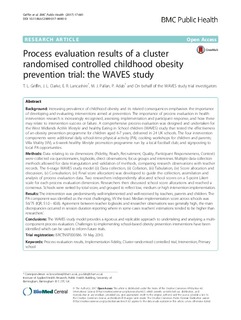| dc.contributor.author | Griffin, Tania L. | |
| dc.contributor.author | Clarke, Joanne L. | |
| dc.contributor.author | Lancashire, Emma R. | |
| dc.contributor.author | Pallan, Miranda J. | |
| dc.contributor.author | Adab, Peymane | |
| dc.contributor.author | Barrett, Tim | |
| dc.contributor.author | Cheng, Kar Keung | |
| dc.contributor.author | Daley, Amanda | |
| dc.contributor.author | Deeks, Jonathan | |
| dc.contributor.author | Duda, Joan | |
| dc.contributor.author | Frew, Emma | |
| dc.contributor.author | Gill, Paramjit | |
| dc.contributor.author | Hemming, Karla | |
| dc.contributor.author | Parry, Jayne | |
| dc.contributor.author | Ekelund, Ulf | |
| dc.contributor.author | Cade, Janet E. | |
| dc.contributor.author | Bhopal, Raj | |
| dc.contributor.author | McGee, Eleanor | |
| dc.contributor.author | Passmore, Sandra | |
| dc.date.accessioned | 2018-01-31T09:31:41Z | |
| dc.date.available | 2018-01-31T09:31:41Z | |
| dc.date.issued | 2017-08-29 | |
| dc.identifier.citation | BMC Public Health. 2017, 17, 681 | nb_NO |
| dc.identifier.uri | http://hdl.handle.net/11250/2480870 | |
| dc.description | Open Access. This article is distributed under the terms of the Creative Commons Attribution 4.0 International License (http://creativecommons.org/licenses/by/4.0/), which permits unrestricted use, distribution, and reproduction in any medium, provided you give appropriate credit to the original author(s) and the source, provide a link to the Creative Commons license, and indicate if changes were made. The Creative Commons Public Domain Dedication waiver (http://creativecommons.org/publicdomain/zero/1.0/) applies to the data made available in this article, unless otherwise stated. | nb_NO |
| dc.description.abstract | Background: Increasing prevalence of childhood obesity and its related consequences emphasises the importance of developing and evaluating interventions aimed at prevention. The importance of process evaluation in health intervention research is increasingly recognised, assessing implementation and participant response, and how these may relate to intervention success or failure. A comprehensive process evaluation was designed and undertaken for the West Midlands ActiVe lifestyle and healthy Eating in School children (WAVES) study that tested the effectiveness of an obesity prevention programme for children aged 6-7 years, delivered in 24 UK schools. The four intervention components were: additional daily school-time physical activity (PA); cooking workshops for children and parents; Villa Vitality (VV), a 6-week healthy lifestyle promotion programme run by a local football club; and signposting to local PA opportunities. Methods: Data relating to six dimensions (Fidelity, Reach, Recruitment, Quality, Participant Responsiveness, Context) were collected via questionnaires, logbooks, direct observations, focus groups and interviews. Multiple data collection methods allowed for data triangulation and validation of methods, comparing research observations with teacher records. The 6-stage WAVES study model ((i) Data collection, (ii) Collation, (iii) Tabulation, (iv) Score allocation and discussion, (v) Consultation, (vi) Final score allocation) was developed to guide the collection, assimilation and analysis of process evaluation data. Two researchers independently allocated school scores on a 5-point Likert scale for each process evaluation dimension. Researchers then discussed school score allocations and reached a consensus. Schools were ranked by total score, and grouped to reflect low, medium or high intervention implementation. Results: The intervention was predominantly well-implemented and well-received by teachers, parents and children. The PA component was identified as the most challenging, VV the least. Median implementation score across schools was 56/75 (IQR, 51.0 - 60.8). Agreement between teacher logbooks and researcher observations was generally high, the main discrepancies occurred in session duration reporting where in some cases teachers’ estimations tended to be higher than researchers’. Conclusions: The WAVES study model provides a rigorous and replicable approach to undertaking and analysing a multicomponent process evaluation. Challenges to implementing school-based obesity prevention interventions have been identified which can be used to inform future trials. | nb_NO |
| dc.language.iso | eng | nb_NO |
| dc.publisher | BioMed Central | nb_NO |
| dc.subject | process evaluation results | nb_NO |
| dc.subject | implementation fidelity | nb_NO |
| dc.subject | cluster randomised controlled trial | nb_NO |
| dc.subject | intervention | nb_NO |
| dc.subject | primary school | nb_NO |
| dc.title | Process evaluation results of a cluster randomised controlled childhood obesity prevention trial: The WAVES study | nb_NO |
| dc.type | Journal article | nb_NO |
| dc.type | Peer reviewed | nb_NO |
| dc.description.version | publishedVersion | nb_NO |
| dc.rights.holder | © The Author(s). 2017 | nb_NO |
| dc.source.journal | BMC Public Health | nb_NO |
| dc.identifier.doi | 10.1186/s12889-017-4690-0 | |
| dc.description.localcode | Seksjon for idrettsmedisinske fag / Department of Sport Medicine | nb_NO |
